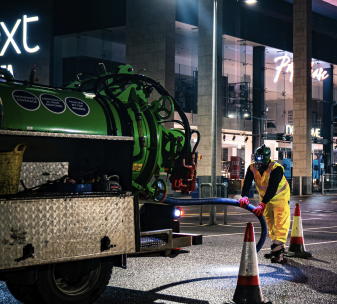Pitch Fibre drainpipes can be much more trouble than they're worth. Once you know you have pitch fibre drainpipes it's important to determine the condition of the pipes and make decisions for the future of your drainage to ward off any drainage problems.
What are Pitch Fibre drainpipes?
During the 1940s pitch fibre drainpipes were developed and seen as the future of drainage. It is easy to understand why this cheaper and lighter alternative seemed better than the traditional clay drainpipes; at first there was a World War going on and for the remainder of the decade the focus was on rebuilding after the war. Pitch Fibre drainpipes were simple to manufacture, lightweight and easy to install. Pitch Fibre was seen as the way forward and these drainpipes were laid up until the 1970s.
Pitch fibre drainpipes are made of wood cellulose/fibre impregnated with coal tar. Often these have also had varying amounts of asbestos added to the material, which was used to add extra strength to the pipes. While these pipes were initially considered to be incredibly advanced, it turns out that there some very specific problems that pitch fibre drainpipes can suffer from.
The drawbacks of Pitch Fibre drainpipes
For one thing we have learned that these drain pipes have a general working life of around 40 years. This means that even the last pipes laid in the 1970s are exceeding their projected lifetime. Furthermore, as lifestyles have changed throughout the past 70 plus years these drains have been subjected to greater volumes of hot water, fat, oils and grease than was perhaps expected back in the 1940s. Fat, oils and grease are a bad idea for any drain, for pitch fibre drainpipes they can be incredibly problematic. These, along with repeat quantities of hot water, can soften the tar and cause delaminations in the form of bubbles in the fibre. Weakening the material means that the pipes can deform underground and eventually, if left untreated, collapse. Weakening the material means that the pipes can deform underground and eventually, if left untreated, a pitch fibre pipe can collapse.
What can you do?
First things first, if you suspect you have pitch fibre drainpipes or if you are having drainage problems we will conduct a CCTV drain survey on the pipework. The pitch fibre is identifiable due to its coal black colour and when it’s plagued with delaminations it can break apart and even bow. Even the bubbles are clear identifiers of pitch fibre as these cannot occur in clay or plastic UPVC drainpipes.
Once identified there are two tried and tested courses of action depending on a variety of factors.
- As with any damaged or broken pipework there is an option to excavate the pipe and replace it with new. This is the only option with collapsed pipes, though might not be the best option for a drainpipe with less damage. Excavations are certainly not a bad choice; we can dig up the pipework, replace it and recover the area, though of course this comes with the drawbacks of time and mess while the excavation takes place. No matter the location of the pipe whether it be a quiet home or a busy place of work, that level of disruption to your day might not be something you want to undertake if you don’t necessarily have to.
- Another solution to your drainage problems is a no-dig repair. The work is all completed on site, usually within a day, whereby we impregnate a polyester liner with resin, which is then inserted into the drain, moved into position and allowed to set. There are a variety of liners that we could use depending on the specific nature of the problem. It is even possible to reform the original pitch fibre back into its original position if it’s started to bow, which we could then line to strengthen the pipe and ensure that the structure will remain intact thereafter.
You can find out more about our drain repair services here.
If you require the services of Metro Rod you can get in touch with us in a variety of ways;
You can go to our website
You can get us on Twitter or Facebook
You can call us on 01869 277702
or you can connect with our sales and marketing team on LinkedIn

Talk to your local Metro Rod specialist
We are always happy to arrange a free site assessment and no obligation quotations for any work you might need. Alternatively, you can call our emergency hotline number on 0800 66 88 00
Get in touch Drainage Services